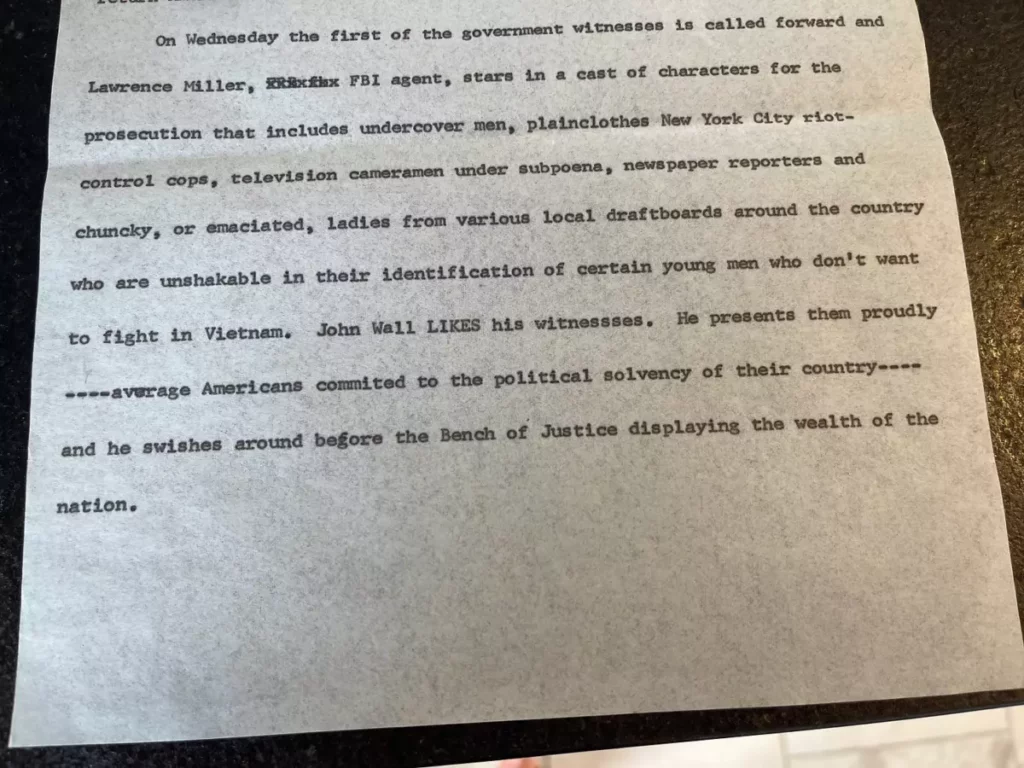First off, I’m just going to put right out there that I have been known to watch live courtroom TV like it’s a job, attending to whatever case is being broadcast into my living room as if auditioning for a seat as an alternate. I can opine about guilt, innocence and the social context affecting a legal outcome with (possibly oversized) confidence. I especially enjoy learning the backstories (gossip) about the various participants. Defendants, attorneys, bloggers and turf-guarding journalists.
They’re all fascinating.
(In another life I might’ve been a court reporter.) Quick aside: I recently learned I may have come by this avocation naturally. I discovered a few pages in a steamer trunk holding copies of my mother’s writings in which she detailed her experiences as an audience member in the Boston Five Conspiracy trial. Pre-livestream she word painted the event. Of course that case had personal ramifications as my dad was one of the defendants and my mom was facing a sixty-month sentence of single parenting if he were to be convicted for counseling young men to evade the draft. He wasn’t.
These days though, watching a trial live (from the comfort of one’s couch) is like sharing in a cultural event without having to put shoes on. Generally there’s history and psychology, family dynamics and impending climax, theories and teams. Talking heads expound and Twitter lights up. It’s a happening.
And nothing has been as gobsmacking as the Alex
(Eleck)
Murdaugh
(Murdock)
trial rising like swamp gas from the drawl of South Carolina Lowcountry. The heinous double-murder of Alex’s wife, Maggie and their twenty-two-year-old son, Paul, is replete with generations of good ol’ boy white collar corruption, class warfare, and drug abuse; it’s an unbelievable story of power and heartbreak, murder and destruction all following this one locally (a distinction made by a disdainful cable commentator) prominent clan.
The term blood kin comes to mind.
Up until recently multi-generations of the Murdaughs exerted undue control over their neighbors by serving as Solicitors (which is like a D.A. or prosecutor but very Southern), effectively deciding who would be charged with crimes and what they would face if convicted. Serious power. The Murdaughs were a family to be feared. They were connected.
And there were whispers about what happened to people who crossed them.
This included young Stephen Smith, a classmate of Buster Murdaugh, Paul’s older brother. Stephen’s body was found splayed out in the middle of the road like a hit and run—only he may have been beaten to death. From a have-not family and openly gay, the suggestion was that the case, or maybe deliberate lack thereof, might have been influenced by the Murdaughs’ wish to keep everything murky. Because there were rumors. And Alex may have aided in a cover-up. Even though he was never an actual Solicitor himself, he did volunteer with the office, and was allowed to carry a pseudo-badge. (And, weirdly, install blue lights on one of his vehicles.) There was limited surprise that whatever had happened to Stephen Smith went unsolved.
Alex dropped his own name with aplomb, lived high on the hog—a nuisance animal he and his boys hunted at Moselle, their 1,700 acre spread. They used wildly expensive guns, carelessly lost and casually replaced. Alex hosted crazy vacations for his sons and girlfriends. There was deep sea fishing and trips to championship ball games. Concerts. Alex and Maggie Murdaugh were known for their hospitality and serving as second parents to the hard partying friends of their boys.
Which was, of course, expensive.
And so, too, was Alex’s years-long Oxy habit that left him as dopesick as anybody jonesing outside a Sackler Family Pill Mill. Fortunately for him, he was able to afford his own dealer, known as Cousin Eddie.
Being a successful personal injury lawyer, Alex was incredibly adept at working the insurance system. In fact, he had a history of robbing people blind.
Corrupt as they come, the man took advantage across the board, doing it with a down-home, eye-contacting charm; yes sir-ing and no ma’am-ing all over the place, his hands elbow deep in the pockets of high-flying law partners and destitute clients alike. He defrauded with well-practiced skill.
Sad case in point: When the Murdaughs’ hardscrabble, longterm housekeeper, Gloria Satterfield, died from injuries sustained when knocked down the brick stairs by the Murdaugh dogs, Alex sued himself on behalf of Gloria’s sons. Only they (originally) didn’t know they’d won anything because Alex hijacked the whole settlement.
Millions.
Discovery of this embezzlement would soon threaten to uncover other crimes. Which wasn’t good. And things were about to get far, far worse.
In February of 2019 Mallory Beach was killed when Paul slammed his boat into a bridge pylon following a night of heavy (underage) drinking. His ugly and violent alter-ego (nicknamed ‘Timmy’) had appeared (with telltale outstretched, Hulkian fingers) to refuse to give up control of the steering wheel to his less-impaired passengers.
His friend paid with her life.
Paul and the other survivors were taken to the hospital. They were followed by Alex, wearing his faux-Solicitor badge, who then big-footed his way into the exam rooms, trying to muddy the waters about who was actually captaining the vessel. The lawyer knew full-well where the accident could end up. In court with forensic accountants going through his business. Which would further unravel his public persona.
Alex, who talked proudly of his wife volunteering at a food bank, stole from his own desperate and grievously injured clients; profiting off their hardship, depositing their award settlements into a dummy account, named almost identically to the real business that his firm used to handle trusts.
(Which you’ve got to admit is pretty slick.)
The heat was on and things were coming undone.
And then in June of 2021 Paul and Maggie were gunned down on their estate. Alex’s colleagues halted their investigation into his suspicious activity. Out of compassion. When questioned about his whereabouts during the murders Alex claimed to be visiting his sick mother. He suggested that the killings were payback for the boat crash.
The police didn’t buy it.
Especially when Alex became the supposed victim of yet another violent crime a couple months later. Claiming to be shot by a stranger on the side of the road, Alex dialed 911 for help.
(Another quick aside: the recordings of calls to emergency services down there will leave you very nervous.)
When the incident turned out to be yet another con, Alex said he actually staged the whole thing with Cousin Eddie in order to leave his life insurance unclouded by suicide clauses, to Buster. Only his drug dealing partner in crime wasn’t having it, claiming that he was being used as an all-around fall guy for everything. (If he’d actually meant to kill Alex, he would have.)
Talk abounded that the disgraced attorney was trying once again to sidestep his oncoming downfall, garnering casserole deliveries in the process.
And then Paul’s phone was finally unlocked, releasing his father’s lies. Paul’s device held evidence from beyond the grave. He’d captured Alex’s voice at the scene of the murders. When Alex admitted, on the stand (to a dumbfounded audience) that he’d actually been with his family the night they were murdered, his longheld claims of innocence were not believed.
***
Nary a TV around the country had time to cool down between jury instructions and the guilty verdict. Despite many people, myself included, who thought a hung jury was very, very possible, it only took them three hours to convict. Alex received two life sentences. (Special shout-out from this professional watcher to Judge Clifton Newman. He gave a master-class in how to preside.) Hopefully, justice for all of Alex Murdaugh’s other victims will also be secured. Keeping open the curtains on commonplace corruption and exploitation should help.
Final aside: The Stephen Smith case has been reopened.

Share this post with your friends.


